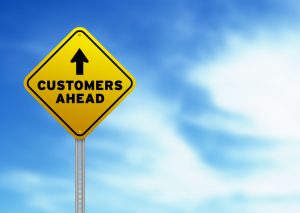Many times, people evaluating the success of a marketing campaign overlook the big picture by solely looking at the financial outcome: did it lead to more sales and money?
While revenue is an essential metric, there is more to marketing success than just the numbers. Focusing too heavily on revenue can actually limit your marketing potential. Achieving success in marketing requires evaluating more than just standard data.
Below are 7 ways to define and measure marketing success beyond the numbers.
FREE Checklist: Common Business Mistakes You MUST Avoid
How To Define and Measure Marketing Success Beyond Numbers
 Defining marketing success beyond only numbers opens doors to many opportunities not regularly considered.
Defining marketing success beyond only numbers opens doors to many opportunities not regularly considered.
Marketing is ultimately about creating and maintaining healthy customer relationships, driving engagement, creating brand awareness and maximizing leads.
By measuring various parameters beyond numbers, you map your progress, calculate your foothold, and adjust your efforts accordingly. It’s not just about achieving more revenue but also about building and growing your brand’s identity and reputation, ultimately leading to lasting success.
1. Brand Awareness
One way to measure marketing success is to gauge your audience’s awareness of your brand.
By measuring this, you can understand if your marketing efforts have helped to boost your brand’s recognition and reputation. Use social media insights, survey tools, and website analytics to track how often your brand is being mentioned and shared on social media, how well your website performs, and how frequently your brand is being searched.
2. Customer Engagement
Customer engagement measures how well your marketing efforts can connect with your audience.
This includes monitoring social media metrics like likes, comments, and shares, email open and click-through rates, and website engagement metrics like time spent on the site, bounce rates, and page views. These metrics enable you to measure if you are reaching, resonating, and connecting with your audience.
3. Lead Generation
Another way to measure marketing success is to check if your campaigns drive lead generation.
This can be measured by tracking contact information or lead forms’ completion rates or monitoring your website’s traffic and conversion rates. This data provides insight into your marketing messages’ effectiveness at driving conversions.
4. Customer Retention
Marketing success should also involve retaining your existing customers.
Measuring retention rate and customer satisfaction or churn rate gives insight into how your marketing can build loyalty and foster a long-term relationship with your customers.
5. Influence
Influencer marketing involves tapping into the reach of individuals in your industry or niche with a following or an established audience.
Measuring the impact of influencer marketing efforts requires tracking engagements and mentions on social platforms, views, reach, and impressions. These measure whether or not influencers have successfully raised brand awareness and driven conversions.
6. Customer Experience
Marketing efforts should also focus on enhancing customer experience.
Measuring satisfaction levels through customer feedback, tracking how customers interact with your website or digital platforms, and monitoring customer support channels can give you insight into your audience’s experience with your brand.
7. Social Responsibility
Social responsibility and ethical marketing can be integrated into marketing techniques by organizations. Marketing campaigns that relate to or positively impact society, measuring their effect through surveys and research, can define the business’ reputation across its consumers and beyond.
Free Download: Common Business Mistakes To Avoid
No one likes to make mistakes, but they are part of the learning process.
Errors can be disheartening, but they don’t have to derail your success for the entire year. Instead, use them as an opportunity to reflect and learn so that you can move forward with better strategies and tactics. With some self-reflection, you can make the most of the mistakes in your business and use them as a stepping stone for an even more successful year.
Download my free checklist, Common Business Mistakes, and avoid the false moves and slipups that even veteran business owners and entrepreneurs make.

